
Lawyer Points Out The Illegal Things Employers Do Knowingly And Goes Viral With 25M Views
When you start a job, you trust that your employer is operating in compliance with the laws. The only thing there is trust because most of us don’t know the intricacies of laws, but this is what employers expect and take advantage of, making workers miserable.
However, there are plenty of resources online to find out if what your employer is doing is legal and one of them is TikTok, where lawyer Paige Sparks shares her knowledge about employment and labor laws so people can see for themselves if they have a case.
Paige Sparks specializes in labor and employment law and informs workers about their rights on her TikTok because employers break the law on the regular
Image credits: _paigesparks
“You won’t believe how many employers knowingly break the law”
“My name is Paige Sparks, I’m an employment lawyer, I sue companies for wrongful termination for discrimination and retaliation. I will never be out of a job because they won’t quit doing it. Here are the most common violations of labor laws I see by all companies, no matter what size.
First, and probably most common, is that you are allowed to talk about your pay at work with your coworkers. If your employer has a policy saying that’s not allowed, that’s illegal to enforce or even to have. They cannot discourage you from discussing your pay with your coworkers–it’s a federal right.
The next most common violation that I see is companies improperly denying a request for an accommodation for a disability. They have to engage in what’s called the interactive process and explain why they can or cannot accommodate you and provide possible alternatives. They don’t get to just say, ‘no, I’m not accommodating you.’
If you are an hourly employee and you earn overtime, your employer cannot require you to arrive to work early without paying you so they can’t have you just hanging around waiting to clock in–you need to be paid for all time worked.
Just because you’re a salaried employee doesn’t mean you don’t get overtime automatically. There is a test to see if you are exempt or not from earning overtime. For example, if you’re an office staff person and you’re told your salary, so you don’t get overtime, that’s not really how it works, you may be entitled to overtime.
Just because your boss says you’re a 1099 contractor doesn’t mean you are. I can’t even begin to tell you how many companies I’ve sued for firing someone the day their workers compensation claim settles for no legitimate work reason. Like, that’s not suspicious.
You also can’t be retaliated against for reporting certain illegal discrimination, which is why you always want to make sure you do it in writing so that we can prove that you said it. You also can’t be fired for using things like FMLA.”
Image credits: @lawyerpaige
“The things I’m talking about are illegal in every state because they are federal law”
“So it doesn’t matter if you’re an at-will employment state, it’s still illegal. If you report an illegal safety concern for something happening at work, you may have additional legal protections but be really careful with that because if what you report is not actually illegal, you may not be protected. For-profit companies are not allowed to have you volunteer for work.”
Image credits: @lawyerpaige
“It is your legal right to talk about your pay at work if you want to”
“It’s illegal for your boss to tell you that you’re not allowed to discuss your pay with your coworkers, including bonuses. Under the National Labor Relations Act, you have the right to talk with other employees at your work about your wages.
I don’t care if your employer has a policy in their handbook that says that you can’t talk about wages, it’s illegal to enforce that. You have the right to talk about your wages, whether you’re at work, on break or away from work. Even if you’re not part of a union, you still have these rights.
This protected conversation about wages can take many forms. You can have conversations about how much you and your coworkers make, how much managers make, you can approach and have organized discussion about pay increases with your employer. And they can’t prohibit you from talking about a union or forming a union or joining a union. That’s illegal.
Starbucks is in some pretty hot water right now for union busting and they just lost their argument where a federal judge ruled that any conversations of them prohibiting unions with employees are going to be discoverable and they have to provide those. That’s a big deal.
You can talk about your pay with your coworkers whether you are on or off the clock. It’s also illegal for your employer to retaliate against you or your coworkers for discussing your pay. Any form of retaliation for discussing pay is illegal. So whether they write you up for it or dock your pay for talking about pay–any form of retaliation is illegal.
I just did a legal consultation with someone the other day that the employer was kind enough to put in writing that they were getting written up for discussing their pay. Like, thanks for making it so easy.”
Image credits: @lawyerpaige
“It’s your right to discuss your pay but you don’t have to”
“So if you don’t want to, nobody can make you. Not every state has pay transparency laws, but this is a federal right you have to talk about your wages–it means it applies to all states. Your employer also cannot harass you or threaten you or intimidate you for talking about your pay.
Sometimes there are legitimate reasons for why people are being paid differently, like experience or skill, but sometimes the reason they’re getting paid differently is because it’s illegal discrimination.
For example, being able to discuss your pay is how someone who’s been with the company for 20 years can find out that a new hire that’s significantly younger is making more money than them. That could be illegal age discrimination. Don’t let your employer gaslight you into thinking that you’re not allowed to talk about your pay at work.”
Image credits: Media_photos (not the actual photo)
@lawyerpaige Replying to @smellykellyjellybelly_ good morning ☀️ #law#legal#lawyer#legaltiktok#lawyersoftiktok#work#discrimination#employmentlaw♬ original sound – Lawyer Paige
Despite the fact that many people see TikTok as an app for children that has no use for them, you can trust Paige or at least consider her words, because she is a SLU law graduate and works as an employment lawyer at her own firm she opened last year, Sparks Law Firm.
She told Sonya Palmer, host of LawHer podcast, that she got into employment law accidentally and it wasn’t a big area of law. Paige remembered the moment when she realized that it was for her: “And so when I was clerking, I worked on a case where I was like, wow, this is really cool. And it made sense in my brain, cuz it’s like a formula for discrimination, for example, where it’s like, a protected individual makes the protected complaint, something bad happens. Now you have a case. So that’s what really attracted me to it.”
The lawyer says on her website that representing “individuals who have been wrongfully terminated in violation of state and/or federal law” is one of her biggest passions and TikTok is just another platform where she can reach more people and help them to get on track of defending their rights and to market herself to actually help individuals with their specific case.
Actually, she is helping a lot of people online as she has 1.4 million followers on this platform and on Instagram she is followed by 268k people. The video revealing the laws employers break reached 25 million views and opened a lot of people’s eyes because they didn’t dare to believe it was a violation of the law.
Paige’s videos are strictly for informational purposes and not meant as legal advice because every case is different and has its own nuances, but the general information can help people to have an idea if their employer has done something questionable, according to the law.
But since creating her TikTok account, she has been helping more and more people in real life with their situations. As she revealed to Insider, “I’m booking out appointments two weeks in advance. Before, I’d be calling someone that day because I’d be hungry for the case.”
The videos she posts on TikTok include explanations of different laws translated into human language, Q&A videos in which she answers questions that can be useful for the general audience, and her favorite videos, as she revealed to the Net Influencer, are her coffee story times, in which she makes coffee and reveals the cases she worked with because she can show a bit of her personality as well.
But what makes Paige the happiest is to “stomp down bullies,” as she told Buzzfeed. She added, “If I can give people information so that they feel confident knowing their rights, that really is so rewarding to me.”
Bored Panda got in touch with another employment lawyer, Janelle J. Romero who also has her own law firm called Gen Esq as well as TikTok account with over 30k followers and asked to explain why employers allow themselves to tell the employees they can’t discuss their pay when the law doesn’t allow to enforce such a rule, “Employers who disproportionately pay employees may find themselves at a disadvantage when employees share their salaries with one another. so for example, if one employee finds out she is paid significantly less than another employee and they have similar job titles and experience, that employee may feel empowered to bring it up to her employer and demand a raise. She may even consider filing a lawsuit against her employer for violations of the unequal pay act. Employers who forbid employees from sharing their salaries assume that their employees don’t know they have a legal right to discuss pay and try to take advantage of that to protect themselves.”
The lawyer believes that employees trust their employers too much thinking they would obey the law. She shared from her professional experience that “Most employees [she] speaks to believe that if it’s in the employee handbook, it must be legal and enforceable and employers definitely take advantage of that.”
However, as much as the employers are capable of deceiving their employees, the lawyers are capable of defending them. Janelle works in New York and she told us that employees there are very well protected, but the issue is how to make the prevention more efficient because “the greater issue is that most employees don’t know their rights, which enables employers to exploit them with little to no consequences. As more that employees learn about and assert their rights in the workplace, employers will grow much more weary of exploiting their workers and violating those rights.”
Lawyers like Janelle and Paige are the ones who help fixing this issue as they are sharing their knowledge they acquired by studying, working and doing research to the general public. Janelle actually comments, “I think it’s really exciting how social media has enabled attorneys like myself to share legal information with employees and help them better assert their rights in the workplace and other aspects of life. Hopefully over time we will be able to help change the culture of servitude in the workplace and empower all employees to view their employment as a legally protected business relationship, which it is, instead of a blessing bestowed by an employer.”
Did you know that the things Paige mentioned were illegal in the US? Do you think it’s worth fighting for your rights or is it just easier to change jobs? Have you ever considered going to a lawyer because of how your employer treated you? Let us know your thoughts in the comments.
People in the comments were surprised to know that these things were illegal and didn’t realize how serious they were when they witnessed them at work
Oh man, the stories I could tell about my family’s small business… XD Tons of law-breaking c**p. I tried over and over to change the way my mom and sister did things so that we wouldn’t get sued or get whacked by the Labor Board. I told them that we were doing illegal things and we HAD to stop them. But my mom and sister “knew what they were doing” and never listened, as in their minds I’m still 13 years old and a snot-nosed brat. Guess what? We got sued by employees multiple times AND got whacked by the Labor Board multiple times. My sister used to “threaten” that she’d get my mom to remove my name off the books/ownership of the company if I didn’t do what she wanted, all the time. The day when my mom and sister finally DID do that was the best day of my life. Now, when they inevitably get sued again, it’s all on them. My name and finances are safe XD
"Just because you’re a salaried employee doesn’t mean you don’t get overtime automatically." Is it common in the US to not have your hours in your contract when you are salaried? Any job I have worked with a salary (not US) has in the contract that you are expected to work x amount of hours a week. If you are asked to work any more hours than that, it has to be considered overtime
Federal regulations on exempt vs non-exempt are pretty clear… except for allowing employers to put employees with special creative skills on salary (lots of creativity goes into the interpretation of that). This left a loophole that’s widely exploited. Also, one of the major dollar stores made everyone: cashiers and shelf-stockers into assistant managers, killing their overtime pay. Lawyers like the OP have to consider before taking your case: small mom and pop wage thieves will just claim bankruptcy and open shop under a new LLC. Big offenders like Amazon, who make their warehouse employees clock out then stand in line for half an hour being inspected for purloined merch, can hire big law firms and lobbyists.
Load More Replies...At Dollar General in Alabama, I've been told by management, in writing, that I'm not allowed to leave the premises during my mandatory 30min - 1hour UNPAID lunch break when I'm the only keyholder. Which is every night. Because I have to be on-site if my cashier needs something that requires my key, like a return. Even though I live so close that you could holler out the front door and I would hear you from my house. I've also gotten flak for not clocking out for my break, (because it's NOT a break,) and making us go over labor. Sadly, Alabama has no labor protections that I know of regarding breaks or overtime. Honestly, they would go back to a time when workers were considered property if they could. And the laws we have on the Federal level are pathetically weak. I still think DG is in violation of one Federal law about unpaid breaks over this. Let me go home and love on my dog for an hour if you're not paying me!
I've deliberately left the property when told I can't while off the clock. If I'm not on the clock then the only order I have to follow is to leave.
Load More Replies...Nearly every job I’ve had, we all knew how much each other made. Only one boss tried to fight about it, at my recent past job, but the disclosure of the new pay outside the company was too much not to discuss. A lot of people left that place for an average of a 50% raise elsewhere.
Being told you aren't allowed to discuss pay is a thing in the UK, too. My daughter (a management Accountant position) found out by chance that the 'new guy', who was both less experienced and not as qualified was earning over £4,000 pa more than her- and she was supervising him at the time. He accidentally let it drop when talking about buying a new car - and s*it hit the fan. My daughter specialises in a particular area of accountancy that was/is hard to find staff for, so they were quick to raise her salary when she threatened to leave.
I get a kick out of stories like this. Legal or not, it occurs everyday with some employers and they get away with it because the workers can't afford a lawyer to fight them. Worked for AutoZone twice and I've seen everything from payroll tampering to racial and/or sexual discrimination to pension theft. And yes, they also forbid you to discuss pay, that's a day 1 thing they tell all new hires and tell you it is a fire-able offense. Whether they'll do it or not who knows but they can certainly cut your hours and/or make the job so horrible you'll quit. As a matter of fact, every job I've ever had told new hires on day one that pay is to never be discussed. Of course it's because someone performing at 50% is being paid more than someone performing at 100%
You're giving legal advice while applying your makeup? I cannot think about employment law while you are getting dressed. That is very unprofessional.
Mandatory overtime is illegal in my state, but non-union shops get away with it because people don't want to lose their jobs.
Once again a post about one particular country - this time the USA, which it usually is - is not acknowledged as being about that country. The employment conditions being pointed out may or may not be pertinent to readers in many countries throughout the world, who also read Bored Panda. It should be made very clear where posts like this actually refer to, otherwise "illegal in all states" could not only mean the 50 USA states (which it obviously does) but any other country in the world who also have states - because **newsflash** the United States isn't the only one.
Oh man, the stories I could tell about my family’s small business… XD Tons of law-breaking c**p. I tried over and over to change the way my mom and sister did things so that we wouldn’t get sued or get whacked by the Labor Board. I told them that we were doing illegal things and we HAD to stop them. But my mom and sister “knew what they were doing” and never listened, as in their minds I’m still 13 years old and a snot-nosed brat. Guess what? We got sued by employees multiple times AND got whacked by the Labor Board multiple times. My sister used to “threaten” that she’d get my mom to remove my name off the books/ownership of the company if I didn’t do what she wanted, all the time. The day when my mom and sister finally DID do that was the best day of my life. Now, when they inevitably get sued again, it’s all on them. My name and finances are safe XD
"Just because you’re a salaried employee doesn’t mean you don’t get overtime automatically." Is it common in the US to not have your hours in your contract when you are salaried? Any job I have worked with a salary (not US) has in the contract that you are expected to work x amount of hours a week. If you are asked to work any more hours than that, it has to be considered overtime
Federal regulations on exempt vs non-exempt are pretty clear… except for allowing employers to put employees with special creative skills on salary (lots of creativity goes into the interpretation of that). This left a loophole that’s widely exploited. Also, one of the major dollar stores made everyone: cashiers and shelf-stockers into assistant managers, killing their overtime pay. Lawyers like the OP have to consider before taking your case: small mom and pop wage thieves will just claim bankruptcy and open shop under a new LLC. Big offenders like Amazon, who make their warehouse employees clock out then stand in line for half an hour being inspected for purloined merch, can hire big law firms and lobbyists.
Load More Replies...At Dollar General in Alabama, I've been told by management, in writing, that I'm not allowed to leave the premises during my mandatory 30min - 1hour UNPAID lunch break when I'm the only keyholder. Which is every night. Because I have to be on-site if my cashier needs something that requires my key, like a return. Even though I live so close that you could holler out the front door and I would hear you from my house. I've also gotten flak for not clocking out for my break, (because it's NOT a break,) and making us go over labor. Sadly, Alabama has no labor protections that I know of regarding breaks or overtime. Honestly, they would go back to a time when workers were considered property if they could. And the laws we have on the Federal level are pathetically weak. I still think DG is in violation of one Federal law about unpaid breaks over this. Let me go home and love on my dog for an hour if you're not paying me!
I've deliberately left the property when told I can't while off the clock. If I'm not on the clock then the only order I have to follow is to leave.
Load More Replies...Nearly every job I’ve had, we all knew how much each other made. Only one boss tried to fight about it, at my recent past job, but the disclosure of the new pay outside the company was too much not to discuss. A lot of people left that place for an average of a 50% raise elsewhere.
Being told you aren't allowed to discuss pay is a thing in the UK, too. My daughter (a management Accountant position) found out by chance that the 'new guy', who was both less experienced and not as qualified was earning over £4,000 pa more than her- and she was supervising him at the time. He accidentally let it drop when talking about buying a new car - and s*it hit the fan. My daughter specialises in a particular area of accountancy that was/is hard to find staff for, so they were quick to raise her salary when she threatened to leave.
I get a kick out of stories like this. Legal or not, it occurs everyday with some employers and they get away with it because the workers can't afford a lawyer to fight them. Worked for AutoZone twice and I've seen everything from payroll tampering to racial and/or sexual discrimination to pension theft. And yes, they also forbid you to discuss pay, that's a day 1 thing they tell all new hires and tell you it is a fire-able offense. Whether they'll do it or not who knows but they can certainly cut your hours and/or make the job so horrible you'll quit. As a matter of fact, every job I've ever had told new hires on day one that pay is to never be discussed. Of course it's because someone performing at 50% is being paid more than someone performing at 100%
You're giving legal advice while applying your makeup? I cannot think about employment law while you are getting dressed. That is very unprofessional.
Mandatory overtime is illegal in my state, but non-union shops get away with it because people don't want to lose their jobs.
Once again a post about one particular country - this time the USA, which it usually is - is not acknowledged as being about that country. The employment conditions being pointed out may or may not be pertinent to readers in many countries throughout the world, who also read Bored Panda. It should be made very clear where posts like this actually refer to, otherwise "illegal in all states" could not only mean the 50 USA states (which it obviously does) but any other country in the world who also have states - because **newsflash** the United States isn't the only one.

 Dark Mode
Dark Mode 

 No fees, cancel anytime
No fees, cancel anytime 







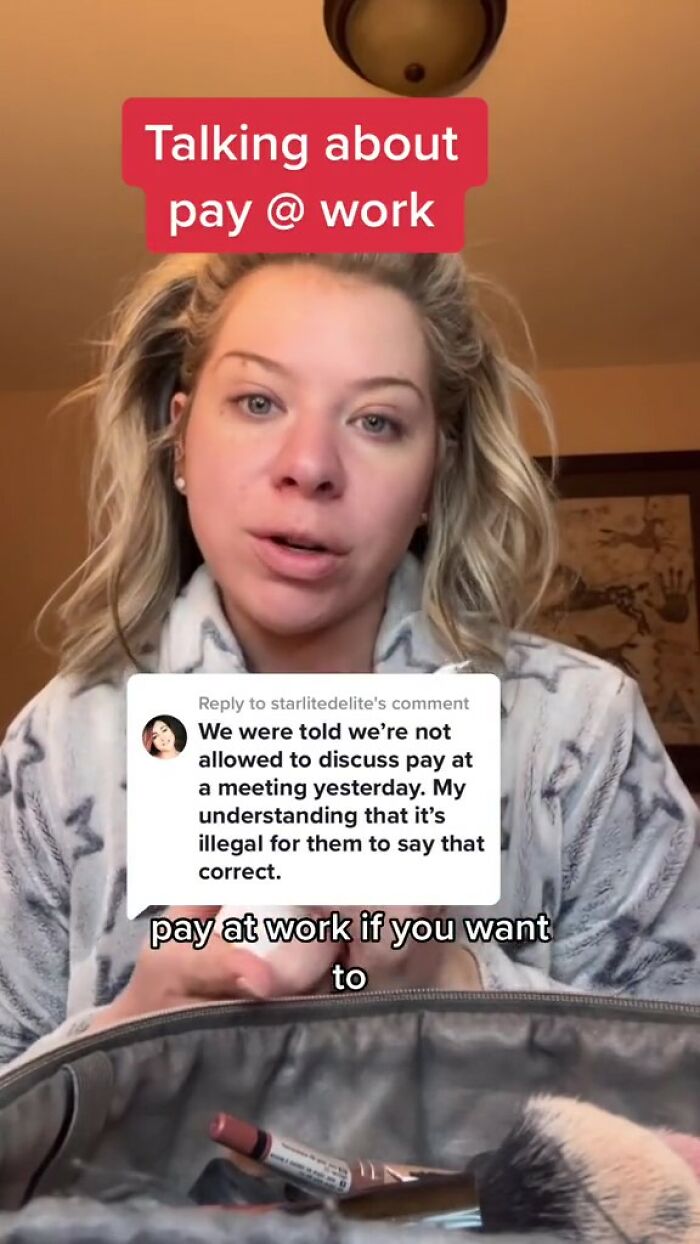



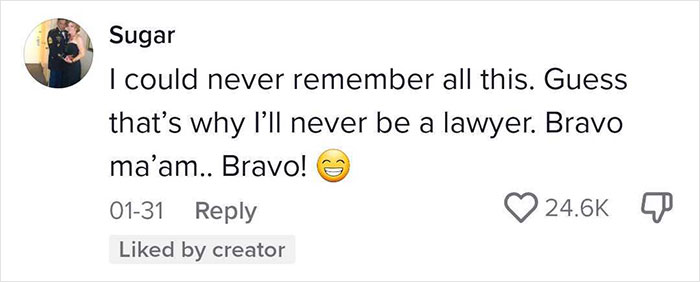

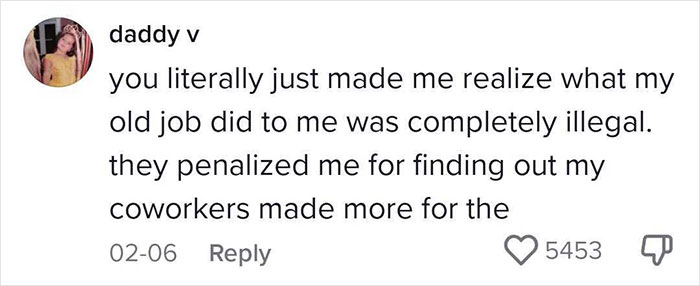



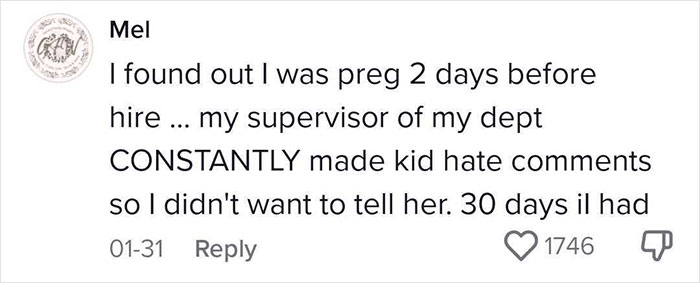
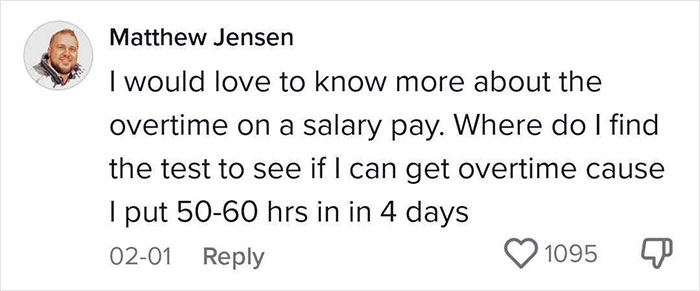


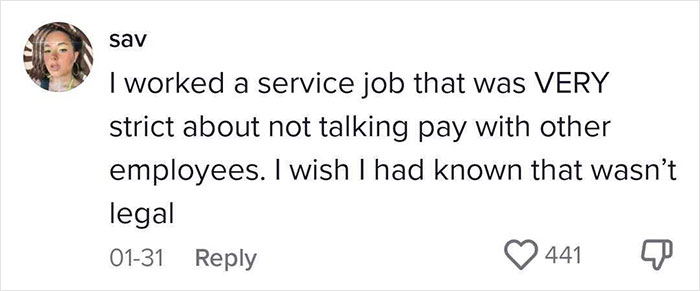
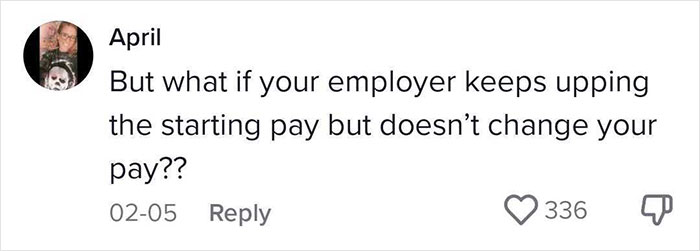


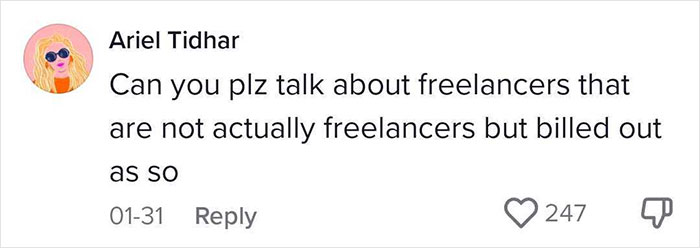

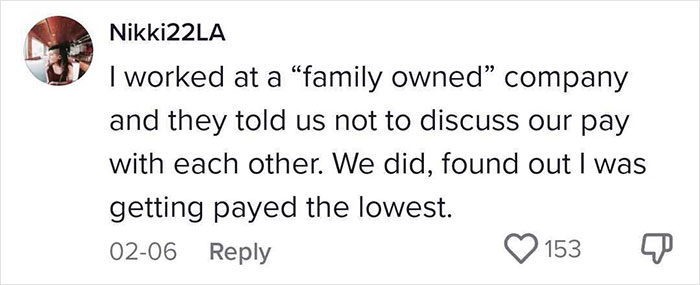














































41
16